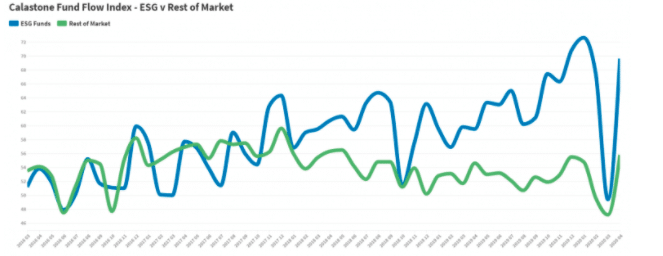
British investors invested more enthusiastically in environmental, social and governance funds over the last three years than in any other category according to Calastone, the global funds network.
Calastone’s Fund Flow Index analysed hundreds of millions of transactions to gauge investor appetite for different types of funds.
FFI Special Report: British investors have opted for #ESG funds over the last three years more enthusiastically than any other category of investment fund. FULL REPORT: https://t.co/uc3dtDGypZ pic.twitter.com/JHUiuEuQp0
— Calastone (@CalastoneLtd) May 20, 2020
The research found that ESG funds had a net investment of just £107m (€120m) between 2015 and 2017. However net inflows increased to £3.9bn between July 2017 and last month.
Edward Glyn, head of global markets at Calastone, said in the report: “It’s surely no coincidence that the growth in ethical funds took off in the autumn of 2017 when Blue Planet II shocked the world by revealing the extent of the ocean plastic pollution problem. A few months after that Extinction Rebellion was formed and then Greta Thunberg addressed the UN Climate Change Conference in Poland.”
There were record inflows of £395m to ESG funds in January this year, almost as much new money as 2015, 2016 and 2017 put together.
“Even March 2020, which saw unprecedented outflows from funds as the pandemic shattered sentiment and saw billions flood out of ‘regular’ funds, ESG funds only saw £17m of outflows,” added Calastone. “Inflows returned in April to the tune of £334m.”
However, Calastone noted that ESG funds are still only around 3% of the total market. Glyn added that the perception that ESG investment may entail lower returns is changing.
“This higher profile for ESG funds and a growing focus on managing non-financial operating risk is driving demand higher too from institutional investors,” he said. “There is also no reason why returns should be lower, especially as governments and courts around the world increasingly expect corporates to bear the cost of poor practices – the vast class-action suits against tobacco companies are a case in point.”
Global ESG flows
The latest Morningstar Global Sustainable Fund Flows Report also found that investors globally put $45.6bn (€42bn) into ESG funds in the first quarter of this year. This compares with global outflows of $384.7bn for the overall market due to the Covid-19 pandemic.
Morningstar researchers compared flows for sustainable funds with those of the wider fund universe as #COVID19 volatility hit the market in the first quarter. See the results in our latest #ESG research: https://t.co/Cqw90uamfW pic.twitter.com/QxzC3NmOlj
— Morningstar, Inc. (@MorningstarInc) May 20, 2020
Morningstar continued that global sustainable fund assets were $841bn at the end of March, down 12% from a record $960bn at the end of last year. However, assets in the global fund universe fell 18% over the same period.
“The continued inflows in first-quarter 2020 speak of the stickiness of ESG investments,” added Morningstar. “Investors in sustainable funds are typically driven by their values, invest for the long term, and seem to be more willing to ride out periods of bad performance.”
Flows into climate-aware funds are expected to continue to grow according to Morningstar due to regulation such as the European Union Action Plan on Sustainable Finance.
ESG fund performance
NatWest Markets, the UK bank, said in a report that MSCI ESG-driven indices have outperformed their conventional “mother” index in the past few months as volatility increased due to the pandemic.
UPDATE: 4 key areas of the #ESG landscape are changing during the #coronavirus crisis – fund performance, fund flows, #investments & engagement. Find out more here: https://t.co/SM3tkFv4GC pic.twitter.com/XywVchBQdH
— NatWest Markets (@NatWestMarkets) May 21, 2020
‘The highest ESG rated firms generally have the necessary policies, procedures and operational oversight to make them better able to withstand external shocks – regardless of what part of their supply chain is hit,” added NatWest Markets.
The bank agreed that sustainable funds have experienced relatively fewer outflows in recent weeks compared to conventional funds.
“This was particularly noteworthy in the passive funds which experienced almost no outflows at the height of the market volatility at the end of March,” said the report.
The bank warned that ESG investors cannot afford to sit on their laurels and many are considering how they should be managing their funds in response to coronavirus. For example, the United Nations-backed Principles of Responsible Investment has called on members to show “flexibility in financial arrangements” to support companies.
“In this context one would expect ESG investors willing to support covenant waiver / amendment requests as well as liability management transactions (extensions of existing bonds),” added NatWest Markets.
Social bonds
The bank also highlighted the increase in issuance of social bonds used to raise money for responses to the pandemic.
For example, last month NatWest Markets helped French financial agency, BPI, launch its inaugural €1.5bn coronavirus response bond, which had a final order book of €3.3bn. A few days later, CAFFIL issued a €1bn coronavirus social bond to finance public hospitals in France with a 4.5 times oversubscription rate.
“Such sizeable orderbooks reflect a desire from investors, particularly asset managers, to “do their part”,” said the bank. “There are parallels here with the early days of the green bond market.”
The bank added that some investors have called for coronavirus index funds that screen firms for their social response to external societal shocks, such as coronavirus, as well as their broader human capital and community policies.







